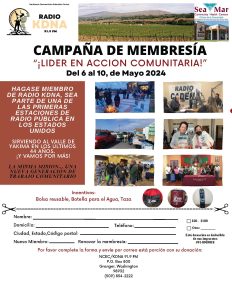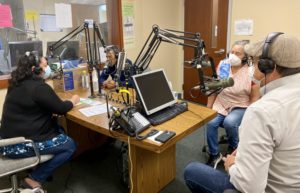El Proyecto Bienestar (EPB) or, Well Being Project, is a long-standing community health intervention effort guided by a Yakima Valley community advisory board and a partnership of: The University of Washington; Northwest Communities Education Center/Radio KDNA; Heritage University; Yakima Valley Farm Workers Clinic.
Past El Proyecto Bienestar projects
Randomized trial of a portable HEPA air cleaner Intervention to Reduce Asthma Morbidity Among Latino Children in an Agricultural Community
Data on pediatric asthma morbidity and effective environmental interventions in U.S. agricultural settings are few. We evaluated the effectiveness of HEPA air cleaners on asthma morbidity among a cohort of rural Latino children.
Find the study here: HAPI Study Asthma Morbidity
Effectiveness of portable HEPA air cleaners on reducing indoor PM2.5 and NH3 in an agricultural cohort of children with asthma: A randomized intervention trial
We conducted a randomized trial of portable HEPA air cleaners with pre-filters designed to also reduce NH3 in non-smoking homes of children aged 6-12 with asthma in Yakima Valley (Washington, USA). Participants were recruited through the Yakima Valley Farm Workers Clinic asthma education program. All participants received education on home triggers while intervention families additionally received two HEPA cleaners (child’s sleeping area, main living area).
Find the study here: Effectiveness of portable HEPA air cleaners
The home air in agriculture pediatric intervention (HAPI) trial: Rationale and methods
Data addressing air quality effects on children with asthma in rural U.S. communities are rare. Our community engaged research partnership previously demonstrated associations between neighborhood NH3 and ambient PM2.5 and asthma in the agricultural lower Yakima Valley of Washington. As a next step, the partnership desired an intervention approach to address concerns about pediatric asthma in this largely Latino immigrant, farm worker community.
Find the study here: The home air in agriculture pediatric intervention (HAPI) trial: Rationale and methods
Effectiveness of portable HEPA air cleaners on reducing indoor endotoxin, PM10, and coarse particulate matter in an agricultural cohort of children with asthma: A randomized intervention trial
We conducted a randomized trial of portable HEPA air cleaners in the homes of children age 6–12 years with asthma in the Yakima Valley, Washington. All families received asthma education while intervention families also received two HEPA cleaners (child’s bedroom, living room). We collected 14-day integrated samples of endotoxin in settled dust and PM10 and PM10-2.5 in the air of the children’s bedrooms at baseline and one-year follow-up, and used linear regression to compare follow-up levels, adjusting for baseline.
Find the study here: Effectiveness of portable HEPA air cleaners on reducing indoor endotoxin
Nitrate Well Water Testing in Agricultural Communities: Improving Environmental Health Communication with Health Behavior Theory
This pilot project developed a process for tailoring communication materials that promote well water testing specifically for private well water users in the Lower Yakima Valley. Our project was guided by a committee of local stakeholders of the Lower Yakima Valley (LYV) in Washington State, including El Proyecto Bienestar and the Latino Community Fund.
See more here: PNASH Pilot Nitrate Well Water Testing Agricultural Communities Improving Environmental Health
Home Air in Agriculture — Pediatric Intervention (HAPI) Trial
(NIEHS 2014-2019) This study is addressing three highly underdeveloped components of asthma and environmental research: the health of children with asthma living in communities with industrial-scale agricultural operations, asthma in a particularly vulnerable subpopulation (Latino farmworker children), and evidence-based intervention strategies within these populations. HAPI aims to reduce child exposure to inflammatory agents and allergens in the home through the use of high-efficiency particulate air cleaners and a home-based education program.
Health & Safety of Women Ag Workers
(MAAF 2013-2014 and PNASH Pilot Project 2015-2016) The overall objective of this project, being conducted through El Proyecto Bienestar, is to examine and address sexual harassment as an occupational health hazard in the Washington agricultural workforce. This project aims to assess the extent and interrelationship between sexual harassment and worker health. This project was proposed in response to the concern voiced by farmworker health and social service providers about the occupational health risks of women agricultural workers, as well as increased media and legal attention regarding sexual harassment in the agricultural workplace.
View detailed information about this project’s activities, goals, and impacts here!
ConneX Program and UW Summer Extension Course
(HRSA/Yakima Valley Farm Workers Clinic 2011-2013) Since 2003, PNASH has led a summer environmental education course in Yakima, WA with university credit for ConneX program students. ConneX is an education outreach program at the Yakima Valley Farm Workers Clinic with the aim to create a competitive pool of young people from disadvantaged backgrounds to enter health professions. PNASH faculty, partners, and graduate students lead the curricula and organize a field survey or sampling activity. The community surveys from 2004 through 2010 helped our partners understand the environmental and occupational health concerns, and evaluate the effectiveness of our educational interventions.
Aggravating Factors of Asthma in a Rural Environment (AFARE)
(NIEHS 2009-2013) This community-based project characterized ambient triggers of asthma in the rural setting by following 50 (children and adults) asthmatic community participants, mapping their exacerbations, and comparing these with known agricultural exposures. Subsequently, ambient sampling with an innovative and adaptable sampler confirmed the nature of the exposures. A multifaceted evaluation assessed the process, outcomes, and impact of the program on the partnership, the participants, the clinical providers, and the community.
Publications:
Kim NJ, Vásquez VB, Torres E, Nicola RM, Karr C. Breaking the Silence: Sexual Harassment of Mexican Women Farmworkers. J Agromedicine. 2016;21(2):154-62.
Perla ME, Iman E, Campos L, Perkins A, Liebman AK, Miller ME, Beaudet NJ, Karr CJ. Agricultural occupational health and safety perspectives among Latino-American youth. J Agromedicine. 2015;20(2):167-77.
Drieling, R.L., Sampson, P.D., Krenz, J.E. et al. Randomized trial of a portable HEPA air cleaner intervention to reduce asthma morbidity among Latino children in an agricultural community. Environ Health 21, 1 (2022)
Riederer AM, Krenz JE, Tchong-French MI, et al. Effectiveness of portable HEPA air cleaners on reducing indoor PM2.5 and NH3 in an agricultural cohort of children with asthma: A randomized intervention trial. Indoor Air. 2021;00:1–13.
Masterson, Erin E., et al. “The Home Air in Agriculture Pediatric Intervention (HAPI) Trial: Rationale and Methods.” Contemporary Clinical Trials, Elsevier, 25 July 2020, https://www.sciencedi
Riederer AM, Krenz JE, Tchong-French MI, et al. Effectiveness of portable HEPA air cleaners
on reducing indoor endotoxin, PM10, and coarse particulate matter in an agricultural cohort of children with asthma: A randomized intervention trial. Indoor Air. 2021;31:1926–1939 Effectiveness of portable HEPA air cleaners on reducing indoor endotoxin



